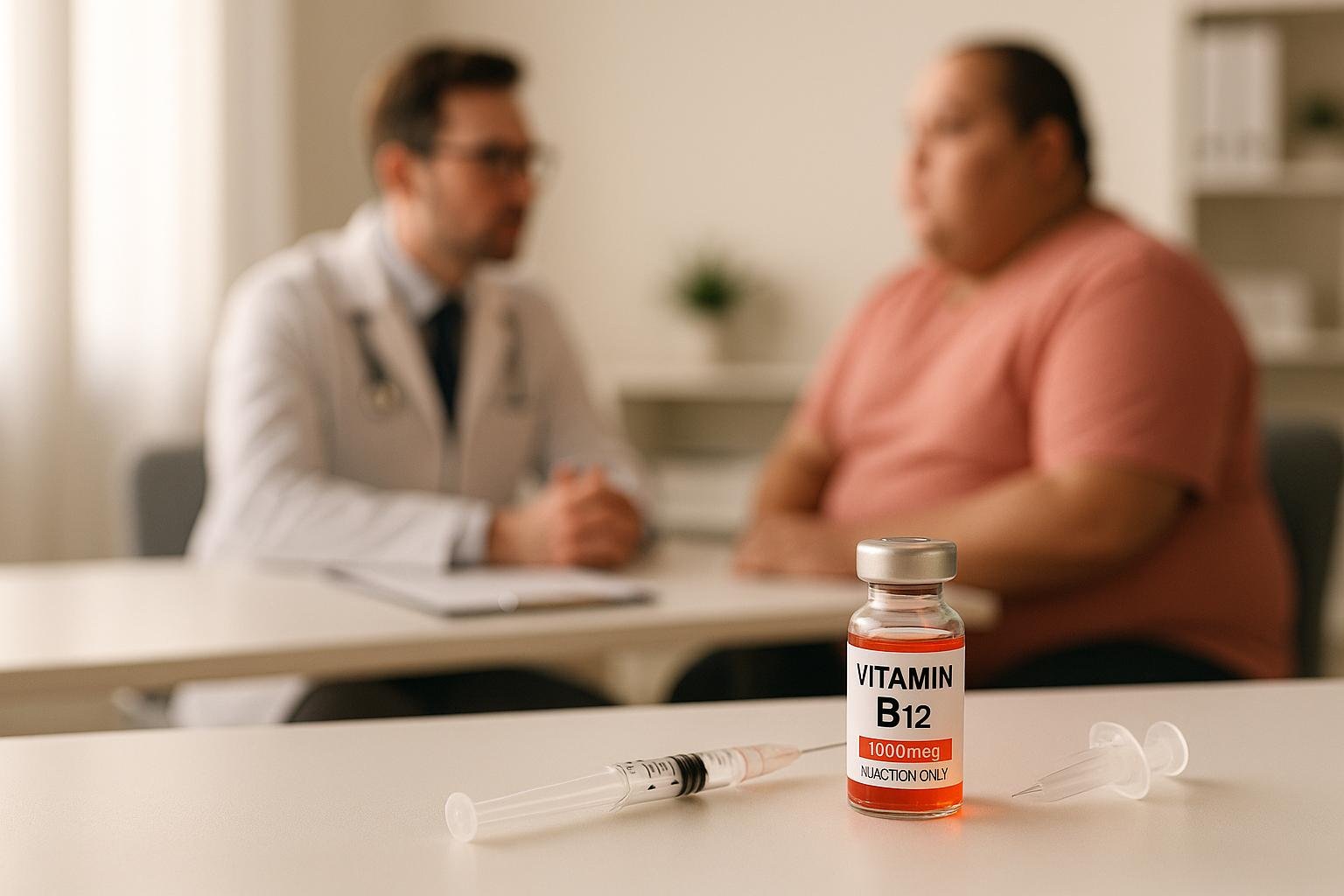Vitamin B12 deficiency is a common issue for bariatric surgery patients, affecting up to 70% within five years post-surgery. This is due to changes in the digestive system that impair B12 absorption. Here’s what you need to know:
- Before Surgery: 12% of patients are already B12 deficient.
- After Surgery: Roux-en-Y gastric bypass (RYGB) patients are 3.55 times more likely to develop B12 deficiency compared to sleeve gastrectomy patients.
- Health Risks: Deficiency can cause anemia, nerve damage, and cognitive decline if untreated.
- Testing: Regular B12 testing is critical – every 3-6 months initially, then annually.
- Supplementation: Options include sublingual tablets, injections, or nasal sprays, with 1,000 mcg daily recommended for most patients.
Proper monitoring and consistent supplementation are essential to prevent serious complications.
The Importance of B12 | Post Surgery Nutrition | Blossom Bariatrics | Las Vegas

What Causes B12 Deficiency After Surgery
Bariatric surgery can significantly disrupt the body’s ability to absorb vitamin B12, leading to deficiencies through several mechanisms.
Poor Absorption Due to Changes in the Digestive System
One of the main reasons for B12 deficiency after bariatric surgery is the alteration of the digestive system’s structure, which interrupts the intricate process required for B12 absorption.
Under normal circumstances, vitamin B12 binds to proteins in food and is released in the stomach by the action of stomach acid. It then attaches to a protein called intrinsic factor, which facilitates absorption in the terminal ileum. However, bariatric surgery disrupts this process by reducing stomach acid, decreasing the production of intrinsic factor, and delaying the release of necessary enzymes – issues that are particularly pronounced after Roux-en-Y gastric bypass (RYGB) surgery.
Deficiency symptoms can appear as early as two months post-surgery, often signaled by elevated homocysteine levels. RYGB poses the greatest challenges because it bypasses the parts of the stomach that produce intrinsic factor and reduces both stomach acid and enzyme production. It also delays the release of pancreatic enzymes essential for processing B12. In comparison, sleeve gastrectomy, while it also reduces the stomach’s absorptive surface, generally causes fewer disruptions than bypass procedures.
On top of these physical changes, dietary adjustments post-surgery further complicate B12 intake.
Dietary Challenges After Surgery
Bariatric patients often face dietary limitations that contribute to B12 deficiency. These issues stem from both the physical effects of surgery and the body’s altered response to food.
Many patients develop an intolerance to meat, which is one of the primary dietary sources of vitamin B12. This intolerance, combined with difficulty digesting protein-rich foods in the months following surgery, creates significant obstacles to maintaining adequate B12 levels.
The reduced size of the stomach pouch also limits food intake, making it harder to consume enough B12-rich foods. In some cases, repeated vomiting after surgery further reduces the body’s ability to retain nutrients.
Another key issue is inconsistent use of B12 supplements. Many patients struggle with regular supplementation due to forgetfulness, cost, or difficulty tolerating the supplements. When supplementation lapses, dietary sources alone often fail to meet the body’s needs.
Beyond these dietary and absorption issues, other factors can increase the risk of deficiency.
Additional Risk Factors
Several other factors can make B12 deficiency more likely after bariatric surgery.
One major factor is pre-existing deficiency. Studies show that about 12% of bariatric surgery candidates are already B12 deficient before their procedure, putting them at greater risk of worsening deficiency afterward.
Bacterial overgrowth syndrome, which affects roughly 35% of RYGB patients, is another concern. This condition allows harmful bacteria to thrive in the small intestine, where they interfere with nutrient absorption.
The use of certain medications can also contribute to deficiency. Proton pump inhibitors (PPIs) and H2 receptor blockers, commonly prescribed after surgery to prevent ulcers, can reduce B12 absorption. Additionally, medications like metformin and some anticonvulsants have been linked to an increased risk of deficiency.
These combined factors contribute to the high prevalence of B12 deficiency, with studies showing that up to 70% of patients experience it within five years after surgery.
B12 Deficiency Rates and Supplement Use Patterns
Research highlights troubling trends in vitamin B12 deficiency among bariatric surgery patients, with variations depending on the type of surgery, how long it’s been since the procedure, and adherence to supplementation guidelines.
How Deficiency Rates Change Over Time
Vitamin B12 deficiency tends to worsen as time passes, with the steepest increases occurring in the first few years after surgery. For instance, patients who undergo Roux-en-Y gastric bypass (RYGB) often experience a rapid decline in B12 levels. Deficiency can appear as early as two months post-surgery, rising from 19% at the one-year mark to nearly 30% by year three. In contrast, those who have sleeve gastrectomy generally experience a slower onset of deficiency due to less drastic changes in their digestive system.
When looking at long-term trends, the data is mixed. One study found that up to 70% of patients could develop a B12 deficiency within five years of surgery. However, a larger meta-analysis of 54 studies reported a more stable long-term prevalence of around 8.5% after five years. Liz Goldenberg, MPH, RDN, CDN, from New York-Presbyterian Hospital, explains:
"The body has the ability to store vitamin B-12 for a long period of time, perhaps years; thus, vitamin B-12 status immediately following sleeve surgery may be normal."
As deficiency rates increase over time, sticking to proper supplementation becomes even more crucial.
How Well Patients Follow Supplement Guidelines
One of the biggest challenges in preventing B12 deficiency is ensuring patients follow supplementation protocols. Studies reveal that up to 32% of bariatric patients fail to adhere to these guidelines, and even standard multivitamin formulas (which typically include 2.4 µg of B12) may not be enough.
Several factors contribute to inconsistent supplement use. Common barriers include gastrointestinal side effects (reported by 68.2% of patients), unpleasant taste or smell (23.8%), dissatisfaction with healthcare advice (21.8%), and financial concerns (7.5%). These obstacles underscore the need for healthcare providers to offer more personalized support and refine supplementation plans.
Research involving 1,160 RYGB patients further emphasizes the importance of proper supplementation. Patients using specialized multivitamins were significantly less likely to experience deficiencies in B12, vitamin D, folic acid, and ferritin compared to those relying on standard supplements.
Deficiency Rates by Surgery Type
The type of bariatric surgery plays a major role in determining the risk of B12 deficiency. The table below compares deficiency rates across different procedures:
| Surgery Type | B12 Deficiency Rate | Time Frame | Study Details |
|---|---|---|---|
| RYGB | 42.1% | Post-operative | 95 participants |
| Sleeve Gastrectomy | 5.0% | Post-operative | 95 participants |
| RYGB | 25.5% | 1 year | 98 participants |
| Sleeve Gastrectomy | 6.4% | 1 year | 98 participants |
| RYGB | 16.74% | 12 months | Comparative study |
| Sleeve Gastrectomy | 0.93% | 12 months | Comparative study |
Overall, RYGB patients are 3.55 times more likely to develop B12 deficiency compared to those who undergo sleeve gastrectomy. A comprehensive study tracking patients over two years found that sleeve gastrectomy patients consistently maintained higher serum B12 levels than RYGB patients throughout the follow-up period. These differences highlight the importance of tailoring testing and supplementation strategies to the specific type of surgery.
sbb-itb-13b1319
Using Regular Testing to Prevent B12 Deficiency
Regular testing plays a critical role in managing the rapid onset of B12 deficiency after bariatric surgery. Some patients may already be at risk before surgery, and deficiencies can appear as quickly as two months post-operation. Consistent monitoring is key to maintaining long-term health.
Catching deficiencies early makes a significant difference. Studies show that neurological issues caused by B12 deficiency can often be reversed if detected in time. Without proper monitoring, however, untreated deficiencies can lead to serious neurological and blood-related complications.
When to Test B12 Levels After Surgery
For patients who have undergone Roux-en-Y gastric bypass (RYGB) or restrictive surgeries, testing B12 levels every 3–6 months during the first year post-surgery is essential. After the first year, annual testing is recommended. For those who have had biliopancreatic diversion, testing should occur even more frequently – every three months during the first year and every 3–6 months afterward.
"In our bariatric surgery program at Cincinnati Children’s, all patients get annual micronutrient and nutritional assessments as recommended. It’s also important for them to continue annual nutritional screening after they transition to adult care later in life."
Certain factors may require more frequent testing. Patients on long-term medications like proton pump inhibitors, H2 blockers, or metformin should be monitored closely, as these drugs can interfere with B12 absorption. Similarly, individuals with conditions such as Crohn’s disease or celiac disease need regular screening to manage their elevated risk. Prompt test results allow for immediate adjustments to supplementation when needed.
Changing Supplements Based on Test Results
Test results should guide any changes to B12 supplementation. If levels fall below normal, healthcare providers may need to adjust both the dosage and delivery method to ensure effective absorption.
B12 deficiency can contribute to secondary issues, including neuropsychological disorders and cardiovascular problems, particularly in bariatric patients. Timely modifications to supplement regimens help prevent these complications.
Testing should include a complete blood count and serum B12 levels, especially for patients with known risk factors. This comprehensive approach not only identifies current deficiencies but also flags early warning signs before symptoms arise.
For some patients, standard oral supplements may not be enough to correct deficiencies, even when taken as prescribed. In such cases, alternative delivery methods like sublingual drops, nasal sprays, or intramuscular injections can bypass absorption barriers.
Testing also identifies candidates for specialized multivitamins. A study involving 1,160 RYGB patients found that those using specialized multivitamins experienced fewer deficiencies compared to those relying on standard formulations.
This ongoing cycle of testing, education, and tailored supplementation ensures that patients maintain optimal B12 levels throughout their post-surgical journey, adapting strategies as their needs evolve.
How to Supplement B12 Effectively
Ensuring proper B12 supplementation is essential for post-bariatric surgery patients, as 17–50% of those who undergo RYGB (Roux-en-Y gastric bypass) develop a deficiency within the first few years. Because of this, lifelong supplementation is a must to maintain overall health.
Choosing the Best B12 Supplement Method
There’s no one-size-fits-all solution when it comes to B12 supplementation. The method you choose can make a big difference in how well your body absorbs this critical vitamin. According to the American Society for Metabolic and Bariatric Surgery (ASMBS), patients who’ve undergone gastric bypass or sleeve gastrectomy should aim for 1,000 mcg of vitamin B12 daily. But how you take it – whether as a pill, injection, or spray – matters.
| Supplement Method | Pros | Cons | Ideal For |
|---|---|---|---|
| Sublingual Tablets | Easy to use, affordable, bypasses stomach absorption | Requires daily commitment | Those who prefer convenience and consistency |
| Intramuscular Injections | Highly effective, bypasses all absorption barriers | Painful, time-consuming, requires healthcare visits | Patients with severe absorption issues |
| High-Dose Oral Pills | Convenient, widely available | May not absorb as well, requires higher doses | Those with mild absorption difficulties |
| Nasal Sprays | Bypasses digestive system, easy to use | Expensive, less research available | Patients who dislike pills or injections |
Each method has its strengths, and the best choice depends on your individual needs and lifestyle.
For many bariatric patients, sublingual B12 tablets stand out as an effective option. These dissolve under the tongue and are absorbed directly through the mucous membranes, bypassing the stomach entirely. This feature is especially important for gastric bypass patients, as the surgery removes the part of the stomach responsible for producing intrinsic factor – a protein critical for B12 absorption.
Interestingly, studies show that oral B12 supplementation can be just as effective as hydroxocobalamin injections in RYGB patients with low B12 levels. One study compared 27 patients receiving intramuscular injections (starting with 2,000 mcg, then 1,000 mcg monthly) to 23 patients taking 1,000 mcg daily oral supplements. Both methods proved equally effective. While injections are often considered the gold standard, they come with practical downsides like discomfort, regular healthcare visits, and time demands. For those who dislike needles, oral options are a strong alternative – as long as they’re used consistently.
Lifelong B12 Supplementation: A Non-Negotiable
Bariatric surgery permanently changes how your body absorbs nutrients, making lifelong B12 supplementation non-negotiable. Even with regular supplementation, there’s still about a 20% chance of developing a B12 deficiency 2–5 years after surgery. That’s why regular monitoring and adjustments are critical.
Daily doses typically range from 350–1,000 mcg, depending on the type of surgery and your body’s absorption capacity. For example:
- Patients who’ve had restrictive procedures like gastric banding or sleeve gastrectomy often do well with lower daily doses.
- Those who’ve undergone malabsorptive surgeries, such as RYGB, usually need higher doses.
For patients who struggle with daily compliance, bimonthly intramuscular injections can be a good alternative. These eliminate the need for daily dosing, offering a practical solution for those who find it hard to stick to a routine. Ultimately, the key is to find a method that fits seamlessly into your lifestyle, whether that’s dissolving a sublingual tablet with your morning coffee or scheduling regular injections with your doctor.
Educating Patients on B12 Needs
Despite the importance of supplementation, adherence can be a challenge. Studies show that self-reported supplement use drops to 50% after one year, and electronic monitoring reveals that patients skip supplements on 66% of days.
"Patients get the surgery to make themselves healthier, but if they do not follow the nutrition guidelines, they could be doing themselves a real disservice."
To address this, experts recommend seeing a nutritionist twice a year and following structured programs. Written plans can help patients avoid relying on memory, providing a clear reference for what they need to do.
Simplifying routines can also make a big difference. Suggestions include:
- Using pill organizers or smartphone apps with reminders.
- Opting for compounded vitamins to reduce the number of pills.
- Adjusting supplement forms to address individual barriers, like difficulty swallowing or forgetfulness.
A multidisciplinary team approach – involving nutritionists, primary care providers, and patient-centered education – has proven to be the most effective way to ensure long-term adherence.
When patients understand the "why" behind supplementation, they’re more likely to stay motivated. B12 deficiency isn’t just a minor inconvenience – it can lead to serious issues like irreversible neurological damage, memory problems, and coordination difficulties. Knowing these risks often helps patients prioritize their health.
Resources like Bariatric Wellness offer valuable guidance on B12 supplementation, helping patients navigate their options and make informed decisions. With the right support, patients can successfully manage their long-term health and avoid the complications of deficiency.
Managing B12 Deficiency for Long-Term Health
Taking care of vitamin B12 levels after bariatric surgery is a lifelong commitment. It involves regular monitoring, personalized supplementation, and staying informed about its importance.
If left untreated, B12 deficiency can lead to serious and irreversible health issues. These include nerve damage, cognitive problems, vision loss, mood disorders, and even dementia. For instance, a 38-year-old man developed episodes of psychotic depression due to B12 deficiency after surgery. Once he started supplementation, his symptoms completely disappeared. This highlights how crucial it is to monitor and address B12 levels promptly.
Routine checks of B12 levels are especially important starting six months after surgery. Experts recommend annual micronutrient and nutritional assessments for all bariatric patients, continuing throughout their lives. Consistent monitoring can catch and reverse deficiency symptoms early.
Given that bariatric surgery permanently changes how the body absorbs nutrients, supplementation becomes critical. Patients are generally advised to take 1 mg of oral vitamin B12 daily. Research shows that without supplementation, deficiency rates skyrocket. One study found that 61.8% of patients who went seven years without supplementation had low B12 levels, while another reported a 70% deficiency rate just five years post-surgery. Tailoring supplementation plans to each patient’s surgical outcome is key.
The type of bariatric surgery also plays a role in determining deficiency risk, making personalized care essential. Regular testing and adjustments based on individual needs are vital for long-term health management.
Healthcare providers should also be aware that folate supplementation can sometimes mask B12 deficiency, delaying proper diagnosis. Educating patients about nutrition and the risks of B12 deficiency is a critical part of helping them maintain their health over the long term.
For more tips on effective B12 supplementation and nutrient absorption after bariatric surgery, check out Bariatric Wellness – The Importance of B12. It’s a great resource for understanding how to manage your health post-surgery.
FAQs
Why are Roux-en-Y gastric bypass patients more likely to experience vitamin B12 deficiency compared to sleeve gastrectomy patients?
Vitamin B12 deficiency is a frequent concern for patients who undergo Roux-en-Y gastric bypass (RYGB). This happens because the procedure bypasses parts of the stomach and small intestine – both crucial for absorbing B12. With less stomach area involved, the production of intrinsic factor, a protein vital for B12 absorption, is reduced. Additionally, the smaller available surface area in the digestive tract further limits absorption.
On the other hand, sleeve gastrectomy (SG) mainly reduces the stomach’s size without significantly altering the digestive pathway. This means SG patients face a lower risk of developing a B12 deficiency. Still, for both RYGB and SG patients, regular monitoring and proper supplementation are key to avoiding the long-term effects of B12 deficiency.
What are the most effective ways to maintain proper B12 levels after bariatric surgery?
To keep your B12 levels in check after bariatric surgery, sticking to a regular supplementation plan is key. Options typically include injections, sublingual tablets, nasal sprays, or high-dose oral pills, with the best choice depending on your healthcare provider’s guidance. Injections are often the go-to for tackling severe deficiencies, while other methods work well for long-term maintenance.
Equally important is keeping an eye on your B12 levels through regular blood tests – usually done annually. These tests ensure your supplementation is doing its job and provide an opportunity to tweak your plan if needed. Since bariatric surgery changes how your body absorbs nutrients, lifelong B12 supplementation isn’t just helpful – it’s essential for staying healthy.
Why is regular testing important for preventing B12 deficiency complications after bariatric surgery?
Regular testing plays an essential role for bariatric patients, particularly when it comes to spotting vitamin B12 deficiencies early. Catching these deficiencies in time allows for timely treatment, which can prevent serious health problems down the line. Without enough B12, patients may experience complications such as nerve damage, memory loss, or anemia.
Keeping a close watch on B12 levels not only helps maintain good health but also lowers the chances of developing issues like cardiovascular disease or neuropsychological disorders. Routine testing also makes it easier to adjust supplementation plans to fit each patient’s unique needs, promoting better recovery and overall health after surgery.



